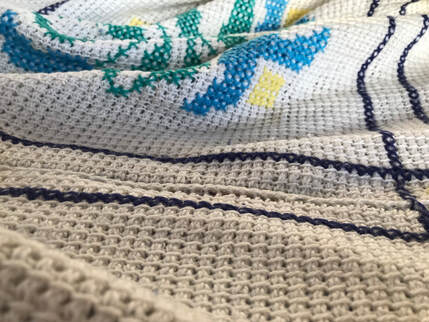 Winter is fast approaching, bringing with it cold nights and the need for blankets to keep us warm. For some time I have been thinking about blankets and their significance. I was recently part of a wonderful wedding celebration that brought family and friends together. It reminded me of a traditional culture of giving blankets as a warm gesture of connection to the new family. Since then I have also had to say goodbye to a dear family friend. There are no words but the comfort of a blanket can bring some relief to this loss. Could the symbol of blankets connect us to both joy and loss? Blankets have always been part of my life. While I don’t have a memory of my own baby blanket, I have knitted some for my children. Blankets are a part of my home, including crocheted square blankets from my mother-in-law and a mismatched blanket pieced together from her left over wool. For me, there is nothing better than to lie under a blanket to watch a movie or take an afternoon nap. Blankets tucked around sleeping babies are always a peaceful sight. A baby held firmly by a blanket on a mother’s back also emphasizes a tender moment of union between mother and child. Each blanket has its own design and could be woven, knitted or crocheted. Handmade blankets are special and unique. Although blankets are different, all are made up of different threads that are connected through a process of knitting or weaving. The threads of blankets originate from different sources, like each of us with our unique genetic material. Wool goes through a special process, including sheep rearing, shearing, spinning and carding. Other fibres, such as cotton, bamboo and synthetic ones, have their own processes to become threads. I am amazed that in a family with the same parents, each child not only looks different but also behaves differently, probably as a result of their own unique experience of family life. We all have different origins and experiences, stories and processes. It does not mean that one thread or person is better or worse than the other. Each of us in this world of nearly 7 billion people is unique and different. Is it be possible to nurture children in a way that they value differences in another’s origins, experiences and stories? If only we could accept that no thread in a blanket or genetic origin and experiences in a person is better or worse than any other, just different, we could create a community of contented children. A single thread does not make a blanket but there must be many threads woven together. In fact, a single thread can easily break but a group of threads is much stronger. So it is with people who come together; they become stronger. This can be seen in families who are supportive of each other; their togetherness helps them to be stronger, especially during tough times. The same is true for communities. Threads, like people need to be connected with each other to form a blanket or group as in a family and community. As humans we need to be connected. I am always amazed that when groups of people meet, they mostly find connections with each other, whether it be a mutual friend or relative, shared journey or experience. I recently became aware of the idea that the solution to any addiction is not just sobriety but, more so, connection with others. Our children so need connection, to know that they are appreciated and valued. In this age of technical connectivity, we all need to make active choices for our wellbeing relating to how we connect with others and especially our children. At this time of the year when we need warmth from the cold, let us use our blankets as a physical reminder of the value of each person’s unique differences and experiences. Let us also be open to connect with others as in this way we become stronger. Let our relationships with others become a source of warmth.
9 Comments
|
Jacqui couperI have different roles; occupational therapist, mother, wife, friend and sister. I am curious about life and how little children grow to their potential with the support of parents, families and the wider community. Archives
March 2022
Categories |
 RSS Feed
RSS Feed